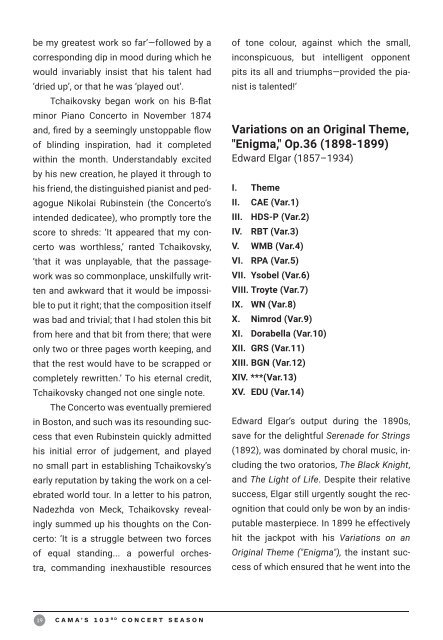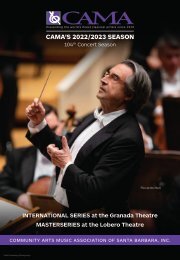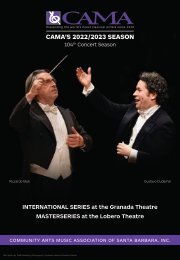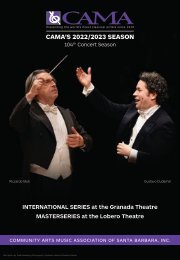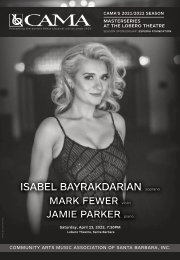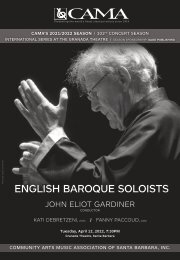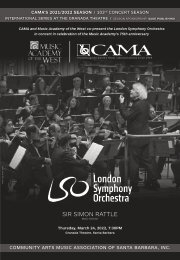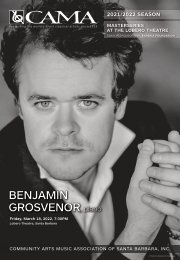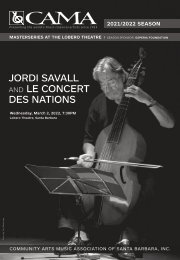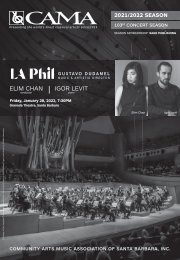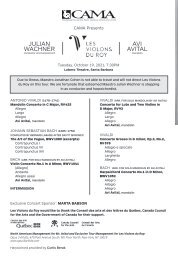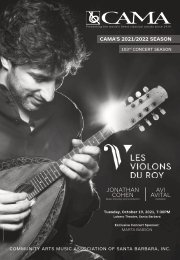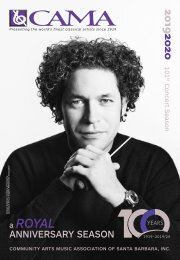CAMA Presents the Royal Philharmonic Orchestra ⫽ Tuesday, January 11, 2022 ⫽ International Series at the Granada Theatre, Santa Barbara ⫽ 7:30PM
TUESDAY, JANUARY 11, 2022, 7:30PM Royal Philharmonic Orchestra Vasily Petrenko, Music Director Olga Kern, piano As the Royal Philharmonic Orchestra celebrates its 75th anniversary, its mission remains to enrich lives through orchestral experiences that are uncompromising in their excellence and inclusive in their appeal. This season the RPO is thrilled to welcome its new Music Director, dynamic young maestro Vasily Petrenko—Artistic Director of the State Academic Symphony Orchestra of Russia, and Chief Conductor of the Royal Liverpool Philharmonic Orchestra. And CAMA celebrates the return of Russian-American pianist Olga Kern, now recognized as one of her generation’s great artists. Having jumpstarted her U.S. career with an historic Gold Medal at the 2001 Van Cliburn International Piano Competition—the first woman to do so in more than thirty years—she was also first prize winner of the Rachmaninoff International Piano Competition at age seventeen. PROGRAM: BRITTEN: Four Sea Interludes, Op.33a, from Peter Grimes TCHAIKOVSKY: Piano Concerto No.1 in B‑flat Major, Op.23 ELGAR: Variations on an Original Theme, “Enigma,” Op.36 • TICKETS: https://ticketing.granadasb.org/15815/15824?promo=5032
TUESDAY, JANUARY 11, 2022, 7:30PM
Royal Philharmonic Orchestra
Vasily Petrenko, Music Director
Olga Kern, piano
As the Royal Philharmonic Orchestra celebrates its 75th anniversary, its mission remains to enrich lives through orchestral experiences that are uncompromising in their excellence and inclusive in their appeal. This season the RPO is thrilled to welcome its new Music Director, dynamic young maestro Vasily Petrenko—Artistic Director of the State Academic Symphony Orchestra of Russia, and Chief Conductor of the Royal Liverpool Philharmonic Orchestra. And CAMA celebrates the return of Russian-American pianist Olga Kern, now recognized as one of her generation’s great artists. Having jumpstarted her U.S. career with an historic Gold Medal at the 2001 Van Cliburn International Piano Competition—the first woman to do so in more than thirty years—she was also first prize winner of the Rachmaninoff International Piano Competition at age seventeen.
PROGRAM:
BRITTEN: Four Sea Interludes, Op.33a, from Peter Grimes
TCHAIKOVSKY: Piano Concerto No.1 in B‑flat Major, Op.23
ELGAR: Variations on an Original Theme, “Enigma,” Op.36
•
TICKETS:
https://ticketing.granadasb.org/15815/15824?promo=5032
Create successful ePaper yourself
Turn your PDF publications into a flip-book with our unique Google optimized e-Paper software.
e my gre<strong>at</strong>est work so far’—followed by a<br />
corresponding dip in mood during which he<br />
would invariably insist th<strong>at</strong> his talent had<br />
‘dried up’, or th<strong>at</strong> he was ‘played out’.<br />
Tchaikovsky began work on his B-fl<strong>at</strong><br />
minor Piano Concerto in November 1874<br />
and, fired by a seemingly unstoppable flow<br />
of blinding inspir<strong>at</strong>ion, had it completed<br />
within <strong>the</strong> month. Understandably excited<br />
by his new cre<strong>at</strong>ion, he played it through to<br />
his friend, <strong>the</strong> distinguished pianist and pedagogue<br />
Nikolai Rubinstein (<strong>the</strong> Concerto’s<br />
intended dedic<strong>at</strong>ee), who promptly tore <strong>the</strong><br />
score to shreds: ‘It appeared th<strong>at</strong> my concerto<br />
was worthless,’ ranted Tchaikovsky,<br />
‘th<strong>at</strong> it was unplayable, th<strong>at</strong> <strong>the</strong> passagework<br />
was so commonplace, unskilfully written<br />
and awkward th<strong>at</strong> it would be impossible<br />
to put it right; th<strong>at</strong> <strong>the</strong> composition itself<br />
was bad and trivial; th<strong>at</strong> I had stolen this bit<br />
from here and th<strong>at</strong> bit from <strong>the</strong>re; th<strong>at</strong> were<br />
only two or three pages worth keeping, and<br />
th<strong>at</strong> <strong>the</strong> rest would have to be scrapped or<br />
completely rewritten.’ To his eternal credit,<br />
Tchaikovsky changed not one single note.<br />
The Concerto was eventually premiered<br />
in Boston, and such was its resounding success<br />
th<strong>at</strong> even Rubinstein quickly admitted<br />
his initial error of judgement, and played<br />
no small part in establishing Tchaikovsky’s<br />
early reput<strong>at</strong>ion by taking <strong>the</strong> work on a celebr<strong>at</strong>ed<br />
world tour. In a letter to his p<strong>at</strong>ron,<br />
Nadezhda von Meck, Tchaikovsky revealingly<br />
summed up his thoughts on <strong>the</strong> Concerto:<br />
‘It is a struggle between two forces<br />
of equal standing... a powerful orchestra,<br />
commanding inexhaustible resources<br />
of tone colour, against which <strong>the</strong> small,<br />
inconspicuous, but intelligent opponent<br />
pits its all and triumphs—provided <strong>the</strong> pianist<br />
is talented!’<br />
Vari<strong>at</strong>ions on an Original Theme,<br />
"Enigma," Op.36 (1898-1899)<br />
Edward Elgar (1857–1934)<br />
I. Theme<br />
II.<br />
CAE (Var.1)<br />
III. HDS-P (Var.2)<br />
IV. RBT (Var.3)<br />
V. WMB (Var.4)<br />
VI. RPA (Var.5)<br />
VII. Ysobel (Var.6)<br />
VIII. Troyte (Var.7)<br />
IX. WN (Var.8)<br />
X. Nimrod (Var.9)<br />
XI. Dorabella (Var.10)<br />
XII. GRS (Var.11)<br />
XIII. BGN (Var.12)<br />
XIV. ***(Var.13)<br />
XV. EDU (Var.14)<br />
Edward Elgar’s output during <strong>the</strong> 1890s,<br />
save for <strong>the</strong> delightful Serenade for Strings<br />
(1892), was domin<strong>at</strong>ed by choral music, including<br />
<strong>the</strong> two or<strong>at</strong>orios, The Black Knight,<br />
and The Light of Life. Despite <strong>the</strong>ir rel<strong>at</strong>ive<br />
success, Elgar still urgently sought <strong>the</strong> recognition<br />
th<strong>at</strong> could only be won by an indisputable<br />
masterpiece. In 1899 he effectively<br />
hit <strong>the</strong> jackpot with his Vari<strong>at</strong>ions on an<br />
Original Theme ("Enigma"), <strong>the</strong> instant success<br />
of which ensured th<strong>at</strong> he went into <strong>the</strong><br />
19 <strong>CAMA</strong>'S 103 RD CONCERT SEASON


